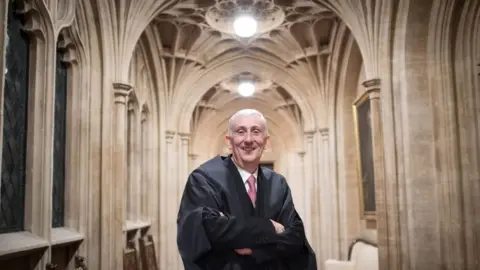Election 2019, Your Questions Answered: What happens to the losers?
 Getty Images
Getty ImagesPolling day on Thursday will see 650 MPs elected to Westminster. But what about those candidates who don't win the seat they're contesting?
Here, we answer a selection of your questions about the election's losers.
Historically, in which election did a party lose the most seats? - Andy Morris, Dundee
The biggest loss for a party in modern political times came when Winston Churchill's Conservatives lost 189 seats as Labour swept to a landslide victory under Clement Atlee in 1945.
The 1997 landslide for Tony Blair's Labour Party comes close, with John Major's Conservatives losing 171 seats in that election.
Labour lost 40 of their 41 Scottish seats in 2015, the year the SNP won 56 of the 59 seats in Scotland.
In 2017, the SNP lost 21 of the 56 they'd won just two years before. This was the second biggest loss of Scottish seats since World War Two.
What happens if the PM loses his seat in the election? - Frankie Abel, Norwich
No incumbent prime minister has ever lost their seat at a general election, although some have come close and several leaders of the opposition have been defeated.
Boris Johnson's majority of 5,034 is the smallest for a sitting prime minister in recent times. The UK does not have a written constitution, so there is no specific rule which says the prime minister has to be an MP.
Indeed, it used to be fairly common in the 19th Century for members of the House of Lords to be prime minister.
However, in practice, it is likely that a prime minister who lost their seat would step down and the Queen would seek to appoint someone who could command the confidence of the House of Commons.
What happens if the speaker loses their seat in the general election? Are they still able to take up the role? - Danny, Musselburgh
 PA Media
PA MediaThe speaker is the MP responsible for chairing debates in the Commons Chamber. By convention, the main parties do not field candidates against the speaker, who will be listed on ballot papers as "the speaker seeking re-election".
This election, speaker Sir Lindsay Hoyle - who was elected in November - will be standing in the seat of Chorley, in Lancashire.
The main parties have not fielded candidates to oppose him, but James Melling is standing for the Greens and an independent candidate, Mark Brexit-Smith, is also running.
However, the SNP and UKIP and the Green Party have stood against previous speakers.
So technically the speaker could lose their seat. If they do, there must be an election for a new speaker.
If they don't, then the MP who was speaker before the general election is returned and will stand for re-election.
If an MP is not re-elected, do they get any form of redundancy pay? - James Rouse
MPs are no longer MPs once Parliament is dissolved. However, they continue to receive their salary - currently £79,468 a year - up to and including polling day.
As long as they've been an MP for two years or more they will get severance pay if they lose their seat. The Loss of Office Payment is twice their statutory redundancy entitlement. How much they receive depends on their age and the length of time they've been an MP.
Do all retiring MPs get a pension after leaving Parliament or does it depend on years in office? - M Chapman, Edinburgh
Most MPs will qualify for a pension but how much they receive depends on a number of factors including their age, the contributions they have made and how many years they were in office.
MPs have to wait until they are pension age before they can receive their pension. So, for example, if you are a 40-year-old MP who loses their seat in Thursday's election it will be the 2040s when they can start collecting their pension.
The main groups of MPs who might not get a pension are those who had opted out of the MPs' pension scheme or MPs with fewer than two years' service who choose to "cash in" their pension contributions.
What happens in the (extremely unlikely) event that two candidates get exactly the same number of votes? - Stuart Douglas, Edinburgh
Election ties happen rarely, although there was one in a local election in England in 2017.
However, there are some ultra-marginal seats in Scotland in this election, so maybe it's a bit more likely to happen this time.
If the number of votes is tied or very close, candidates can ask for a recount.
For example, in 2017 the Fife North East seat was held by the SNP by two votes - the narrowest margin in the UK - after three recounts.
If it keeps coming out a tie then the returning officer can decide who the winner is by lot.
Whichever candidate wins the lot is treated as though they had received an additional vote that enables them to be declared elected.
It is up to the returning officer to decide the method of drawing lots. But the Electoral Commission guidelines suggest putting a vote for the tied candidates in an empty ballot box and then picking out one, or putting the names in envelopes and picking one.
The candidate whose name is drawn is then declared the winner, with the returning officer having to state: "Following an equality of votes, lots were drawn and, as a consequence, an extra vote was allotted to candidate [name]."


What are your questions about the general election? You can let us know by completing the form below.
In some cases your question will be published, displaying your name and location as you provide it, unless you state otherwise. Your contact details will never be published. Please ensure you have read the terms and conditions.
If you are reading this page and can't see the form you will need to visit the mobile version of the BBC website to submit your question.
